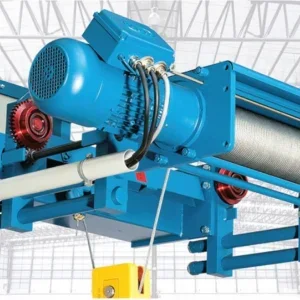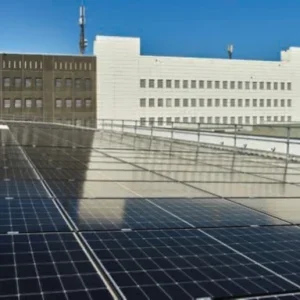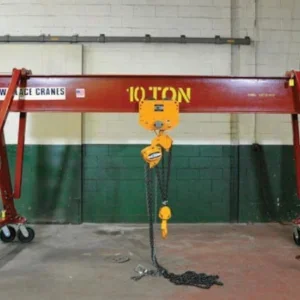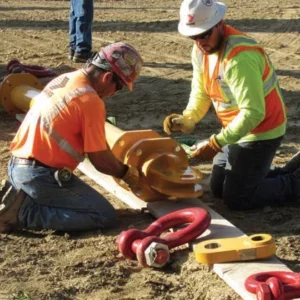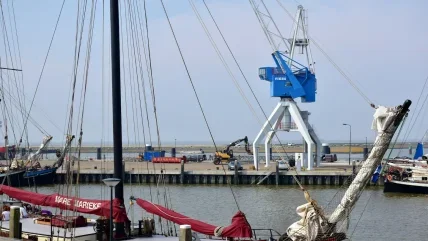
Dillinger Hütte is the largest heavy-plate steel plant in Europe and has its own sales and storage locations all over the world. The company’s Middle East subsidiary is expanding and extending its storage area in Jebel Ali in Dubai, where up to 3,000t of steel are handled every month.
There is demand for its heavy plate in structural engineering as well as for the special steels it produces for the construction of pipelines and facilities in the oil and gas industry. Lengths of up to 40m, widths of more than 5.0m and thicknesses of up to 600mm are no rarity.
The company already possessed two Demag portal cranes for its outdoor store. A third portal crane was needed for a new storage area.
The specifications included 2×16,000kg load capacity, a 28m span, a hook path up to 6.0m, and a very rugged design with high availability even under unfavourable conditions: the crane had to operate outdoors, in temperatures from -10°C to 55°C with strong day-night fluctuations, so positioning needed to be sensitive. Spreaders with load-lifting magnets are used as load-handling attachments.
For this application the Demag engineers designed a double-girder portal crane from the company’s ZPVE range, equipped with heavy-duty DRS wheel blocks and DH hoist units.
The wheel blocks can carry loads of up to 40t. The hoist units are also developed for heavy-duty applications, as were their conical-rotor motors from Demag’s own production. The speeds of the long and cross-travel drives are infinitely variable and the crane can be operated by radio control.
NORTH AMERICA
Metal makers in North America are also demanding overhead cranes – and maintenance programmes for them. Alaskan Copper & Brass Co. was moving a large part of its operation from Seattle and Renton to a facility in Kent, Washington. The company needed new lifting equipment and also wanted to relocate some of its older cranes from the Renton facility. Alaskan Copper owned a total of 138 cranes as well as about 50 different types of underhook devices. Most of them were being maintained in a reactive mode, with repairs occurring only when something stopped working.
In phase one of the relocation Alaskan Copper purchased two 5.0-ton singlegirder CXT cranes from Konecranes, and asked Konecranes also to remove four older cranes from the Renton facility, modify them and move them to Kent. These older cranes had not been purchased from Konecranes but it undertook the task nevertheless. The process went well, and Eagle Hilton, Alaskan Copper’s mechanical project coordinator, retained Konecranes to begin monthly inspections of all of its cranes using Mainman, a multi-point visual inspection programme. Mainman inspection captures data on the condition of over 225 crane components and then analyses, prioritises and schedules required repairs in compliance with local statutes and laws. In phase two, Alaskan Copper purchased four more 5.0-ton double-girder CXT cranes, and also asked Konecranes to provide and install over 700ft (200m) of runway for the new cranes in an existing building. The way the runway was installed in the long bay allowed offloading of product into smaller bays running perpendicular to the runway.
When the inspection programme began Konecranes technicians were working on the older cranes weekly. But one year later, as larger issues revealed by the inspections were resolved, Konecranes inspects just 15-18 cranes a month on a regular schedule. A parallel programme for inspecting the under-hook devices has also been implemented. Konecranes takes care of significant repairs, while minor issues are handled in-house.
“In the first year, we spent a good bit of money resolving long-term problems with the older cranes, but since then our maintenance costs have gone down by around 60%,” says Hilton. “The biggest benefit is that downtime and significant breakdowns have been drastically reduced. Now we prefer to maintain equipment at more optimum levels. With our new policy of outsourcing of maintenance for critical equipment like forklifts and cranes, we’re down to one inhouse electrician at this facility.”
EUROPE
Europe’s Sheffield Forgemasters is a company that can trace its history back to the 1750s and a blacksmiths shop on the same site that the company currently occupies. Today it is capable of producing the largest and most technically challenging cast and forged steel components in the world: the foundry has capacity for castings of up to 350t and forgings of up to 200t finished weight. The company was acquired in August 2021 by the UK Ministry of Defence, which intends to invest significantly over ten years to re-capitalise defence-critical plant and equipment on site.
In August this year demolition began to facilitate construction of the UK’s largest open-die forging line, which will be one of the most advanced in Europe. Sections of disused forge and foundry buildings, some of them dating from the Victorian era, will give way to space for a 13,000t heavy forge in a new 12,700m2 structure.
Jaso Industrial Cranes has been awarded a contract with Sheffield Forgemasters for the design, supply and installation of seven overhead cranes to service the new forging line. They will have lifting capacity of between 20t and 380t.
“The total order is for a single 25t crane, two service cranes with 100/20t capacity, a 180/40t capacity crane, one 250/50t crane and two main 380/120t forge cranes,” says Steve Marshall, manufacturing transformation director at Sheffield Forgemasters.
“The tender process was very tightly contested, but Jaso has a significant amount of experience in supply of cranes for hot metal and steelworks, which is extremely important for the work that we are undertaking.”
The cranes are due to be supplied and fitted between March 2025 and July 2025.


